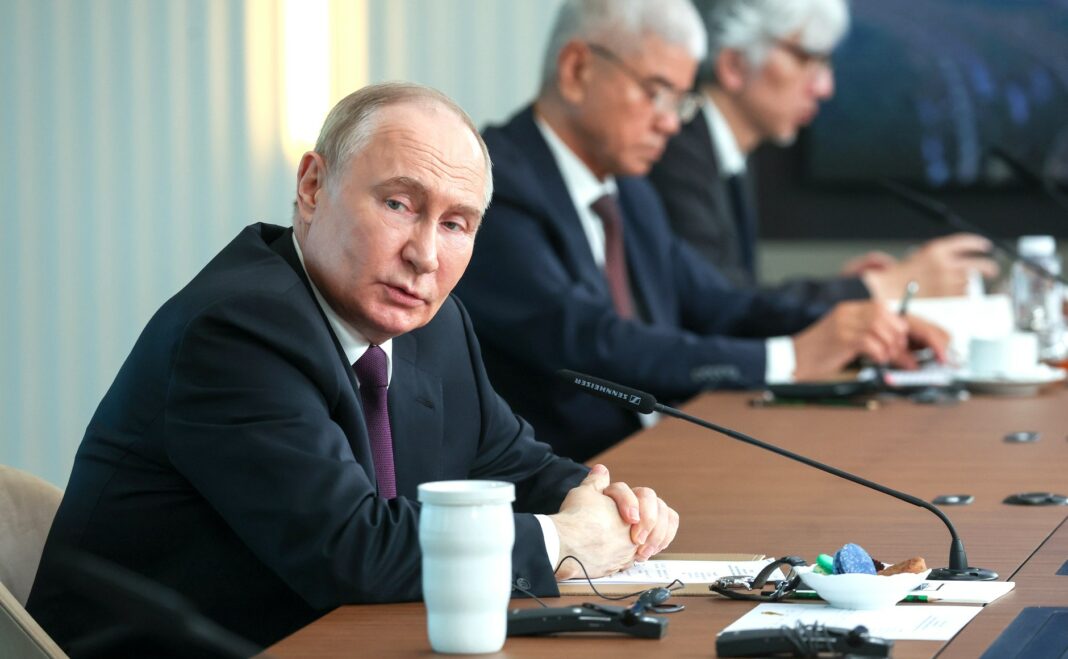Bünyamin Tekin
In a rare bilateral meeting, Russian President Vladimir Putin met with Turkish Foreign Minister Hakan Fidan in Moscow on Tuesday.
The meeting marks Putin’s first encounter with Fidan since his appointment and came just a week after Putin criticized Turkey for its deepening economic ties with Western financial institutions.
“Turkey has focused on obtaining loans, making investments and receiving grants from Western financial institutions. This is probably not a bad thing,” Putin said at a press conference on June 5, as quoted by Turkey’s state-run Anadolu news agency. “But if it is related to the restriction of trade and economic relations with Russia, then the Turkish economy will lose more than it gains. I think there is such a threat.”
As Fidan met with Russian officials, World Bank President Ajay Banga was in Ankara meeting with Turkish President Recep Tayyip Erdoğan and Finance Minister Mehmet Şimşek. They discussed the “Country Cooperation Framework Program” between Turkey and the World Bank, which recently doubled its exposure to Turkey to $35 billion.
Amid Western scrutiny and accusations that Russia is using Turkey to circumvent international sanctions over the war in Ukraine, the US Treasury has imposed sanctions on dozens of Turkey-based companies since the war began. However, US Ambassador to Turkey Jeff Flake said the United States has been “getting better results working” with Turkish authorities to clamp down on these activities.
Turkey imports more than 44 percent of its natural gas from Russia, but pressure from the West has led to a decline in these imports. Between January and April, Russia’s exports to Turkey totaled $15 billion, down $2 billion from the same period of the previous year, according to data from the Turkish Statistical Institute (TurkStat).
Putin acknowledged this decline, attributing it to price adjustments for key export and import goods. “I hope that we will be able to correct this situation in the near future,” he said.
Turkey has maintained a balancing act between its NATO allies and Moscow, not joining Western sanctions against Russia while blocking Russian warships from accessing strategic straits and supplying ammunition and drones to Ukraine.
Putin criticized Kyiv for using Turkish drones to target undersea pipelines in the Black Sea that supply gas to Turkey. “Ukraine tries to hit the pipelines carrying gas to Turkey. This is not a joke or an exaggeration in any way,” Putin said. “Please inform our friend President Erdoğan about the facts regarding this matter.”
Earlier this year, Turkish officials announced that Putin would visit Turkey in February, but the visit did not occur. On Tuesday Putin indicated plans to meet with Erdoğan in person on July 3-4 in the Kazakh capital of Astana on the sidelines of an international event.
Russia analyst Kerim Has highlighted the unusual nature of Putin’s meeting with Fidan, noting that it is rare for Putin to meet with foreign ministers, signaling significant underlying issues. Has suggested that economic tensions, particularly related to Turkey’s growing economic dependence on the Western economic ties, are key factors in the strained relations.
Speaking to Turkish Minute, Has noted that Putin expressed concerns about the high-tech weapons supplied to Ukraine, capable of striking deep into Russian territory, labeling it a significant asymmetric warfare threat. He also criticized Turkey for not opposing NATO’s increasing presence in the Black Sea and for its military cooperation with Ukraine, highlighting the contradictory position Turkey finds itself in.
Has further addressed the economic aspects of the Turkey-Russia relationship. He pointed out that Putin’s explanation for the decline in trade, attributing it to price adjustments, is misleading. Instead, Has suggested that the decrease in trade is due to various issues arising from Turkey’s partial compliance with Western sanctions against Russia, despite not having a formal policy in place. This compliance has caused disruptions in bilateral trade, according to Has.
Energy dependence remains a critical component of the Turkey-Russia relationship. With Turkey relying heavily on Russian natural gas, Putin’s strategic delay of his visit to Turkey signals deeper unresolved issues. Unpaid debts and the stalling of the natural gas hub project indicate significant economic friction, Has underlines. This tension is further compounded by Russia’s reluctance to allow Turkey to control pricing of the Russian gas it sells to Europe, a stance that reflects Russia’s strengthened position over the past couple of years with regards to its war in Ukraine.
Has also touched on the broader geopolitical implications of Turkey’s actions. As Turkey’s economic struggles have forced it to lean more towards the West, Russia feels its investments in Turkey, aimed at circumventing Western sanctions, are at risk. This shift has led to increased pressure on Turkey from both the West and Russia, creating a delicate balancing act for Turkey. The strained communication between Putin and Erdoğan, with fewer direct interactions, indicates the growing volatility of their bilateral relations.



